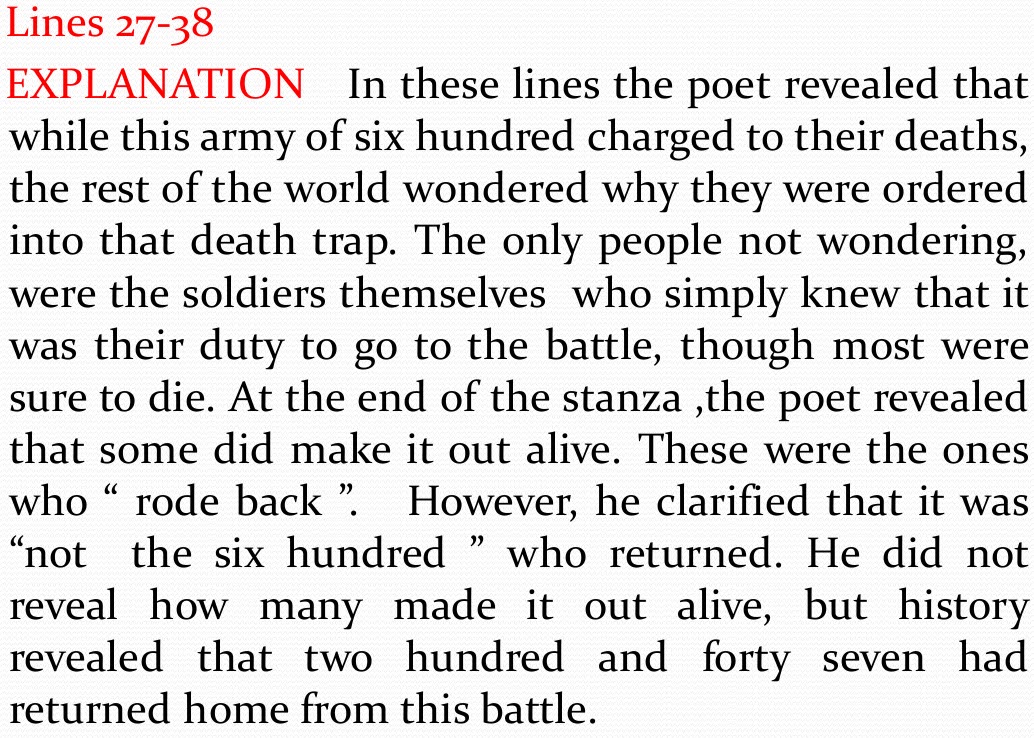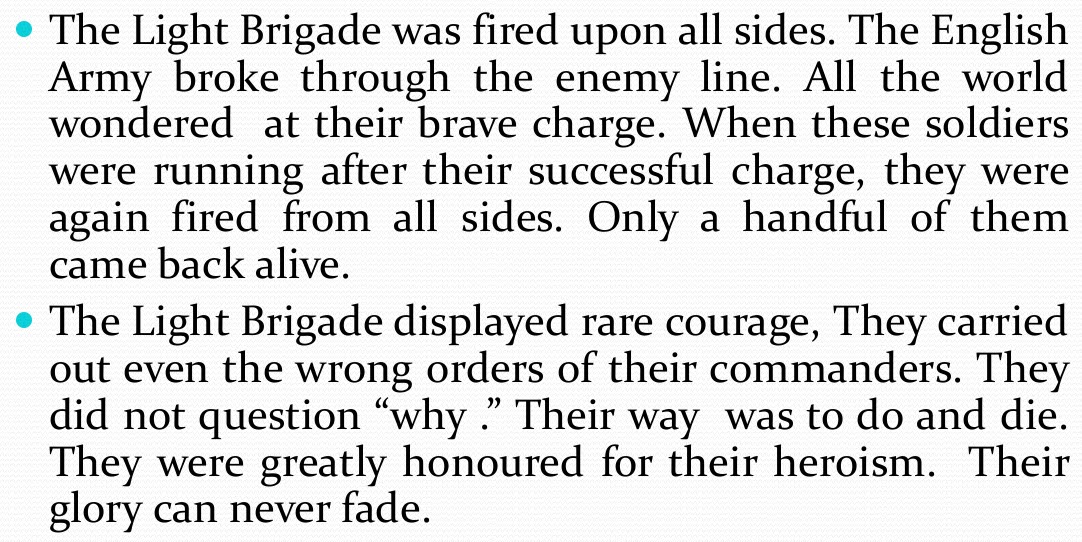THE CHARGE OF LIGHT BRIGADE
GLOSSORY
Half a League: Distance of one and half miles
Valley of Death: The enemy firing line where death is certain
Dismayed: Feel Discouraged
Blundered: made a serious mistake
Volleyed and thundered: Fired cannon balls repeatedly
Jaws of death: The enemy lines where death was certain
Mouth of hell: The area where they were sure to be killed
Sabres bare: naked, Drawn swords
Sundered: Enemy soldier began to run in confusion
OBJECTIVE TYPE QUESTIONS
Q 1 Who wrote the poem “The Charge of
the Light Brigade.”?
Ans.
Alfred Lord Tennyson.
Q 2 How many soldiers were there in the
Light Brigade?
Ans.
Six hundred.
Q 3With what did the soldiers of the
Light Brigade attack on Russian gunners?
Ans.
With their swords.
Q4 How many soldiers came back alive
from the field?
Ans.
Only a handful of them.
Q5 Who were the enemy soldiers?
Ans.
Russians and Cossacks.
Q6 Whose glory can never fade?
Ans.
Of the Light Brigade.
ABOUT POET
Alfred,
Lord Tennyson was the most renowned poet of the Victorian era. He was born on
August 6, 1809, in Somersby, Lincolnsire, England, where his father was the
rector. He was a bright and talented student. He began writing poetry in his
teen age. He was first published in 1840.Tennyson was Queen Victoria’s laureate
from 1850 until his death in 1892. He excelled at penning short lyrics, such as
“Break, Break. Break”, “The charge of Light Brigade” “Tears, Idle Tears” and
“Crossing the Bars”
INTRODUCTION TO THE POEM
THE CHARGE OF THE LIGHT BRIGADE
The
poem was inspired by an incident that occurred during the Crimean War
(1854_1856) in which the English, the Turks and the French fought against the Russians.
During the battle of Balaclava the Russians captured many Turkish guns. The
Commander of the Light Brigade, Lord Cardigan, received orders from the seniors
Commander to recapture the guns. The order was carried out and the Light
Brigade attacked the Russians gun positions with drawn swords. They pounced
upon the Russian gunners and broke their line. The soldiers of the Light
Brigade displayed rare courage. They came back victorious. But only 195 of the
607 soldiers came back alive. In this poem, the poet pays tribute to the
heroism of English soldiers.
THE CHARGE OF THE LIGHT BRIGADE
Half
a league, half a league,
Half
a league onward,
All
in the valley of Death
Rode
the six hundred.
“Forward,
the Light Brigade!
Charge
for the guns!” he said.
Into
the valley of Death
Rode
the six hundred.
“Forward,
the Light Brigade!”
Was
there a man dismayed?
Not
though the soldier knew
Someone
had blundered.
Theirs
not to make reply,
Theirs
not to reason why,
Theirs
but to do and die.
Into
the valley of Death
Rode
the six hundred.
Cannon
to right of them,
Cannon
to left of them,
Cannon
in front of them
Volleyed
and thundered;
Stormed
at with shot and
shell,
Boldly
they rode and well,
Into
the jaws of Death,
Into
the mouth of hell
Rode
the six hundred.
Flashed
all their sabres bare,
Flashed
as they turned in air
Sabring
the gunners there,
Charging
an army, while
All
the world wondered.
Plunged
in the battery-smoke
Right
through the line they broke;
Cossack
and Russian
Reeled
from the sabre stroke
Shattered
and sundered.
Then
they rode back, but not
Not
the six hundred.
Cannon
to right of them,
Cannon
to left of them,
Cannon
behind them
Volleyed
and thundered;
Stormed
at with shot and shell,
While
horse and hero fell.
They
that had fought so well
Came
through the jaws of Death,
Back
from the mouth of hell,
All
that was left of them,
Left
of six hundred.
When
can their glory fade?
O
the wild charge they made!
All
the world wondered.
Honour
the charge they made!
Honour
the Light Brigade,
Noble
six hundred!
Explanation of the poem
LINES 1-8
REFERENCE TO THE CONTEXT These
lines have been taken from Tennyson's poem, “The charge of the Light Brigade” This
poem is a tribute to the heroism of the Light Brigade. The soldiers displayed
great courage. They carried out the orders of their commander though it meant
sure death.
Explanation In
the Crimean war, the Russians captured some guns of the English army. The
English army was ordered to recapture the guns. The six hundred English
soldiers rode to their deaths. They were marching one and half miles straight
into the valley of death. The soldiers knew that it was a wrong order yet they
carried out the order willingly and bravely. They pounced upon the Russian
gunners with their naked swords.
LINES 9- 17
Explanation
These lines revealed the thoughts of the soldiers as they marched on. Though
they knew that someone had made a mistake which would cost them all their
lives, they moved forward anyway, to do the duty that they came to do. They did
not think that it was their place to respond to the mistakes that was made, nor
even try to reason through why they were marching to sure deaths. Rather, they
simply saw it as their duty to follow commands and to do what they came to do.
Lines 18-26
EXPLANATION
It is a narrative poem .The poet speaks as one who was there and saw it all.
The soldiers knew that they were trapped. There were canons on all sides of
them, but still they rode into the battle, and the speaker says they rode very
well. In these lines, the reader can imagine the brave young soldiers, riding
with their heads held high into a battle where they were sure to lose. The six
hundred men rode into “the jaws of death” with the proud valour of soldiers
willing to die for their country.
Lines 27-38
EXPLANATION
In these lines the poet revealed that while this army of six hundred charged to
their deaths, the rest of the world wondered why they were ordered into that
death trap. The only people not wondering, were the soldiers themselves who
simply knew that it was their duty to go to the battle, though most were sure
to die. At the end of the stanza, the poet revealed that some did make it out
alive. These were the ones who “rode back”. However, he clarified that it was
“not the six hundred” who returned. He did not reveal how many made it out
alive, but history revealed that two hundred and forty seven had returned home
from this battle.
Lines 39-49
Explanation The
speaker states that there were canons on all sides of these soldiers and both
the “horse and hero fell”. He again attested their bravery by saying that “they
had fought so well”. They returned through “the jaws of death” and from “the
mouth of the Hell” But they were not the six hundred but only a handful of
them.
Lines 50-55
Explanation The
Light Brigade was ordered to attack the Russian gunners. The command was
wrongly given. It meant sure death. But the Light Brigade carried out the orders
bravely. In this stanza the speaker asks the rhetorical question, “When can
their glory fade?” suggesting that they would be forever remembered for their
honour in marching so bravely into the valley of death. The speakers repeats
“all the world wondered.” It means that people from all the world better
understand the intensity of danger they faced. The whole world knew that it was
a death trap and they all wondered why they were sent to fight. The poet wishes
all honour for those six hundred brave soldier of the Light Brigade. He says
that their glory can never fade.
SUMMARY
The charge of Light Brigade celebrates an act of bravery and sacrifice—a
suicidal cavalry charge during the Crimean war. This war was fought between the
English and the Russians.
The Russians had captured some guns of the English army. The Light Brigade of
English army was ordered to recapture these guns. The soldiers knew that it was
a wrong order, given by mistake. It meant sure death for the soldiers. Yet the
English army carried out the orders willingly and bravely. They pounced upon
the Russian gunners with their swords.
The Light Brigade was fired upon all sides. The English Army broke through the
enemy line. All the world wondered at their brave charge. When these soldiers
were running after their successful charge, they were again fired from all
sides. Only a handful of them came back alive.
The Light Brigade displayed rare courage, They carried out even the wrong
orders of their commanders. They did not question “why.” Their way was to do
and die. They were greatly honoured for their heroism. Their glory can never fade.
Theme Of The Poem
The
Charge of the Light Brigade” issues a clear call to celebrate the heroism of
soldiers who surrender themselves to a greater cause. The soldiers of the light
brigade, knowing that their lives are in danger, nevertheless follow orders and
charge the enemy gun emplacements at the end of the valley. Assuming that the
mission is important and necessary for the success of the British campaign,
these men brave the artillery fire from all sides to carry out orders. Tennyson
states clearly that such behavior is to be honored, and that the fame of these
soldiers deserves perpetual veneration.


















